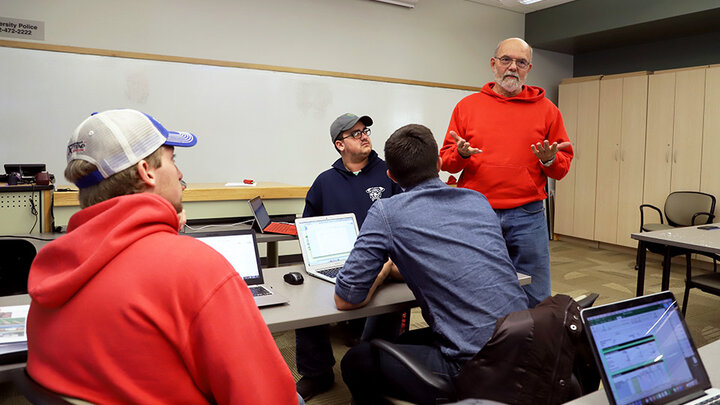Stephen Mason talks with students about their final project and presentation in the Agronomy 405 Crop Management Strategies course.
Stephen Mason, agronomy and horticulture professor emeritus, has led a distinguished career at the University of Nebraska–Lincoln and officially retired Sept. 5 after 33 years of teaching and research.
However, he’s not completely finished with his teaching career. Mason was contracted to teach the capstone course Agronomy 405 Crop Management Strategies this fall semester which ends in December. And, according to Mason, he will then be “graduating” to a new phase of professional and personal life.
“I’m not a believer in complete retirement, but I look at it as a graduation to a new set of activities where I will still be discovering new opportunities in the field of agronomy,” he said.
Mason began his career at Nebraska in 1984 as an assistant professor in crop production and management with a 75 percent teaching and 25 percent research appointment. He was moved to a 50/50 appointment in the early 1990s and promoted to full professor in 1994.
Stephen Mason
Mason was involved with instruction of all undergraduate grain crop production courses at Nebraska including Agronomy 132 Plant Science Laboratory (Plant level), Agronomy 204 Resource Efficient Crop Management (field level) and Agronomy 405 Crop Management Strategies (farm level). In addition, he co-taught Agronomy 201 Career and Intern Preparation in Agronomy, Agronomy 437/837 Animal, Food and Industrial Uses of Grain, Agronomy 438/838 Production of Specialty Grains and co-led CASNR/Education Study Tours to Argentina.
Of all the interesting courses, Mason considers Crop Management Strategies his favorite. “I loved this class more than any other,” he said. “I enjoyed learning right along with the students. It pulled us out of the classroom and into the real world. It has been my reality check — discovering new trends, practices and herbicides.”
Mason said he’s had many alumni tell him they disliked Agronomy 405 because it pushed them, but it was the class they now appreciate and ended up using the most in their career.
“It’s important because it’s not just about a field or plant, you’re working with the whole system on a farm and how it relates to the well-being of people and the ecological concerns of the community. We get to see the big picture and that’s fascinating,” he said.
He has also listened to what former students have said about what they learned and what’s expected in today’s industry, and in turn, integrated economics and crop budgets into his courses in order to stay relevant and meet student and employer needs.
He greatly enjoyed teaching and working with graduate students, he said, particularly students from developing countries. Working with the International Sorghum and Millet (INTSORMIL) program gave him the opportunity to conduct research — mutually beneficial to developing countries and Nebraska, mentor graduate students and work with them after they returned to their countries.
He was the principal investigator for the INTSORMIL Collaborative Research Support Program from 1986–2007 and regional coordinator for INTSORMIL Central America Program for seven years. He was a member of a four-year research project in Burkina Faso and served as the IANR point person for collaboration with the University of Zagreb in Croatia for numerous years.
Mason’s research at Nebraska focused on production practice and environment effects on grain quality of maize and grain sorghum, dryland production practices for maize and grain sorghum including plant population and planting date, yield component analysis, grain sorghum/soybean rotation, production practices for pearl millet as an alternate grain crop as well as international research in Africa and Latin America.
“Over the course of his career, Steve has had a tremendous impact on students and our profession,” said Richard Ferguson, interim department head of agronomy and horticulture.
These impacts are reflected in numerous honors and awards including CASNR and university undergraduate teaching and advising awards, the Nelson Outstanding Graduate Student Advising Award and outstanding teaching awards from the American Society of Agronomy and Crop Science Society of America. He also was named a Fellow of the ASA, CSSA and National American Colleges and Teachers of Agriculture.
Mason earned his doctorate in agronomy from Purdue University. He has authored/co-authored more than 90 peer-reviewed journal publications, four book chapters and one book.
As for this new phase of his life, Mason is looking forward to traveling with his wife, Nora D’Croz-Mason, and spending time with his two sons, daughter-in-laws and granddaughter. He is currently assisting D’Croz-Mason, adjunct assistant professor of agronomy and horticulture, to complete her research project and he hopes for the possibility of future international consulting opportunities.
Congratulations on your “graduation,” Professor Emeritus Mason.




